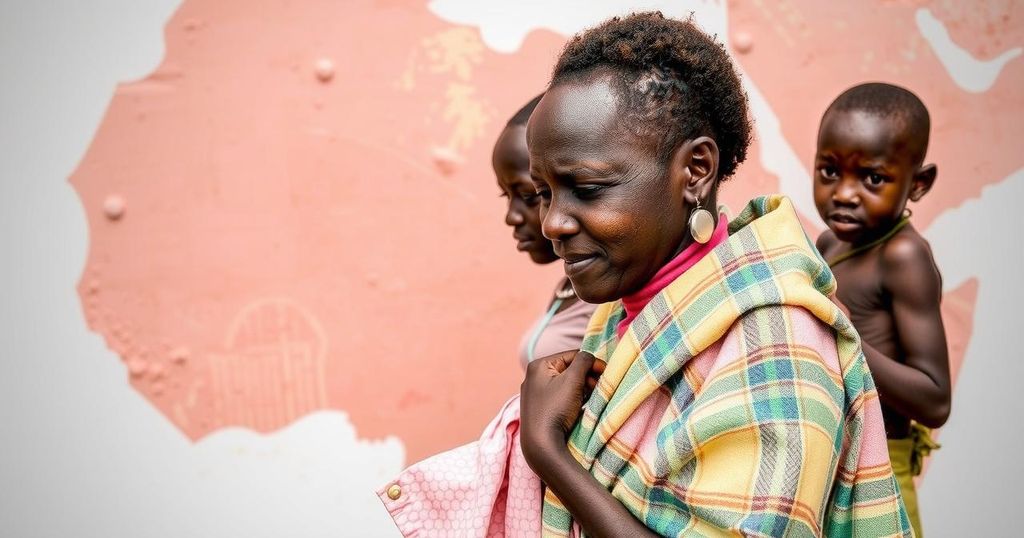South Sudan continues to face a severe humanitarian crisis stemming from ongoing conflict, climate shocks, and public health emergencies. With over a million displaced individuals and rising needs for food, shelter, and healthcare, urgent assistance is required to support affected communities, especially as refugees from Sudan exacerbate the situation. The combined impact of violence and climatic challenges calls for immediate humanitarian intervention to safeguard the well-being of vulnerable populations.
The humanitarian crisis in South Sudan remains dire more than a decade after independence, exacerbated by years of conflict and climatic shocks. The country faces severe food insecurity, public health challenges, and violence, particularly against vulnerable groups such as women and girls. In 2024, the economic downturn and the conflict in neighboring Sudan intensified these needs. With over a million people displaced by flooding and ongoing violence, the demand for life-saving assistance is at an unprecedented level, particularly in the realms of food, shelter, and healthcare services.
Climate-related risks have profoundly impacted South Sudan, ranked as the second most vulnerable nation to natural hazards globally. Frequent flooding, droughts, and heatwaves have destroyed local resilience and livelihoods, with close to 1.4 million individuals acutely affected by floods as of November 2024. The concurrent effects of flooding and drought threaten food security, as the agriculture sector struggles to cope with changing climate patterns, inevitably leading to a rise in humanitarian needs.
In terms of conflict, while formal hostilities may be subdued due to peace agreements, localized violence persists, particularly among youth engaged in cattle raiding and resource disputes. Humanitarian access is hindered by these ongoing tensions, further complicating efforts to address urgent needs. The United Nations Mission reported significant increases in intercommunal violence, which has raised alarm regarding human rights violations.
The crisis from Sudan has compounded South Sudan’s humanitarian emergency, with hundreds of thousands fleeing across borders amidst safety concerns. These individuals often arrive in vulnerable conditions, necessitating immediate humanitarian support to address their needs for shelter, food, and health services. The existing infrastructure is stretched thin, with host communities facing additional pressures amid their own economic hardships.
Moreover, public health crises loom large as multiple outbreaks, including malaria and cholera, continue to plague the nation amid economic and logistical challenges in health service delivery. Limited immunization coverage and insufficient healthcare facilities exacerbate the situation. As a result, a fragmented public health response increases the risk of disease spread, calling for urgent intervention and support in the healthcare sector.
The humanitarian situation in South Sudan is the result of a complex interplay of prolonged conflict, climatic challenges, and economic instability. Since gaining independence in 2011, the nation has faced persistent violence, food insecurity, and health crises, leading to widespread displacement and extreme vulnerability among its population. The Revitalized Peace Agreement signed in 2018 was meant to foster stability, but sporadic violence and intercommunal tensions continue to disrupt efforts toward recovery. The country is heavily impacted by climate change, making it susceptible to both natural disasters and severe health crises due to inadequate infrastructure and healthcare services. The influx of refugees from the Sudan crisis in 2023 further highlights the need for enhanced humanitarian support and infrastructure development to address escalating needs.
In conclusion, South Sudan is grappling with an ongoing humanitarian crisis characterized by the intersection of conflict, climate change, and public health challenges. The urgency for immediate humanitarian assistance grows as the situation intensifies, especially with the added burden of refugees from Sudan. Addressing the fundamental needs for food, healthcare, and shelter is critical for alleviating suffering and building resilience within vulnerable communities. The international community must respond promptly and effectively to enhance recovery efforts and support the affected populations in South Sudan.
Original Source: www.unocha.org







